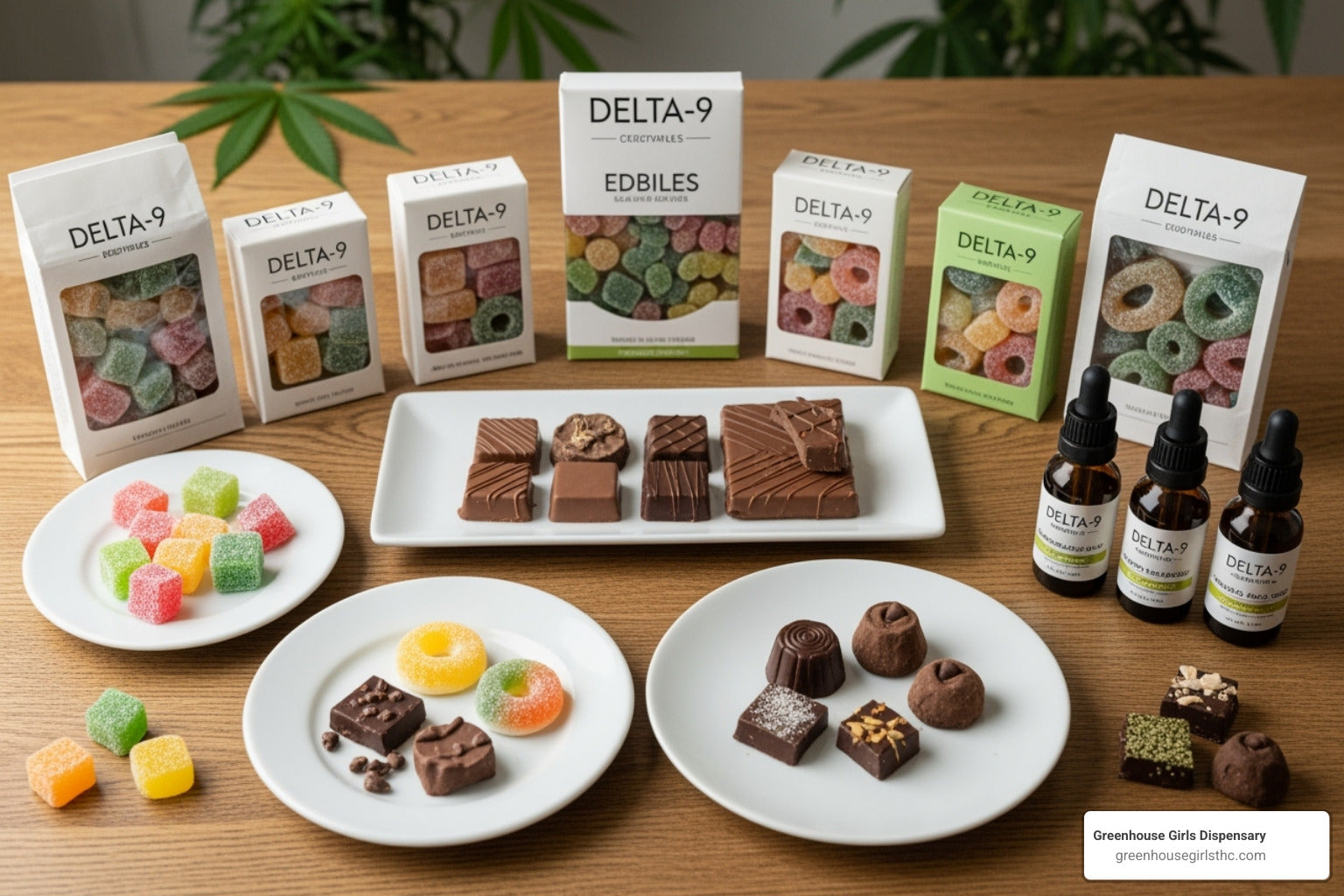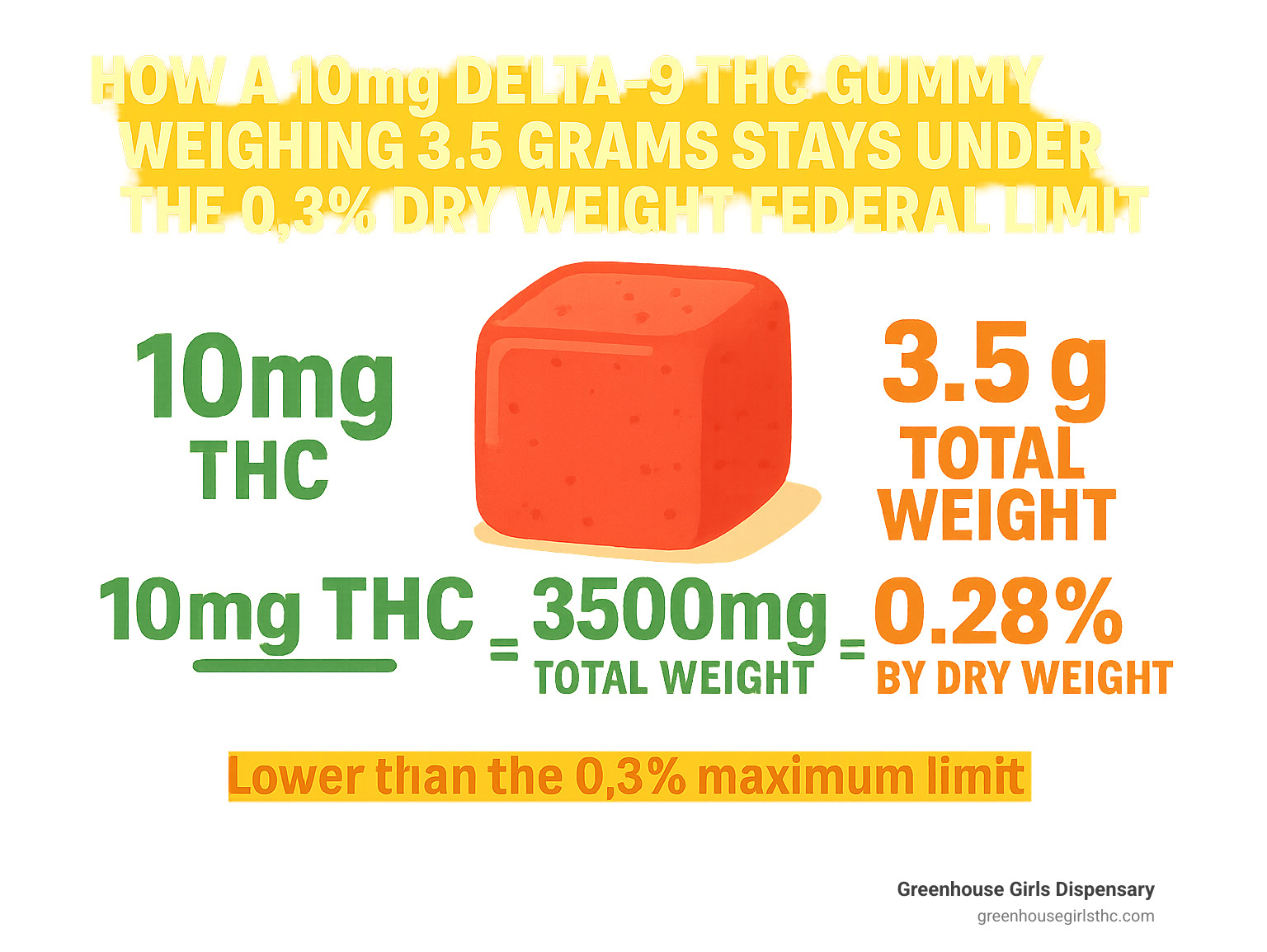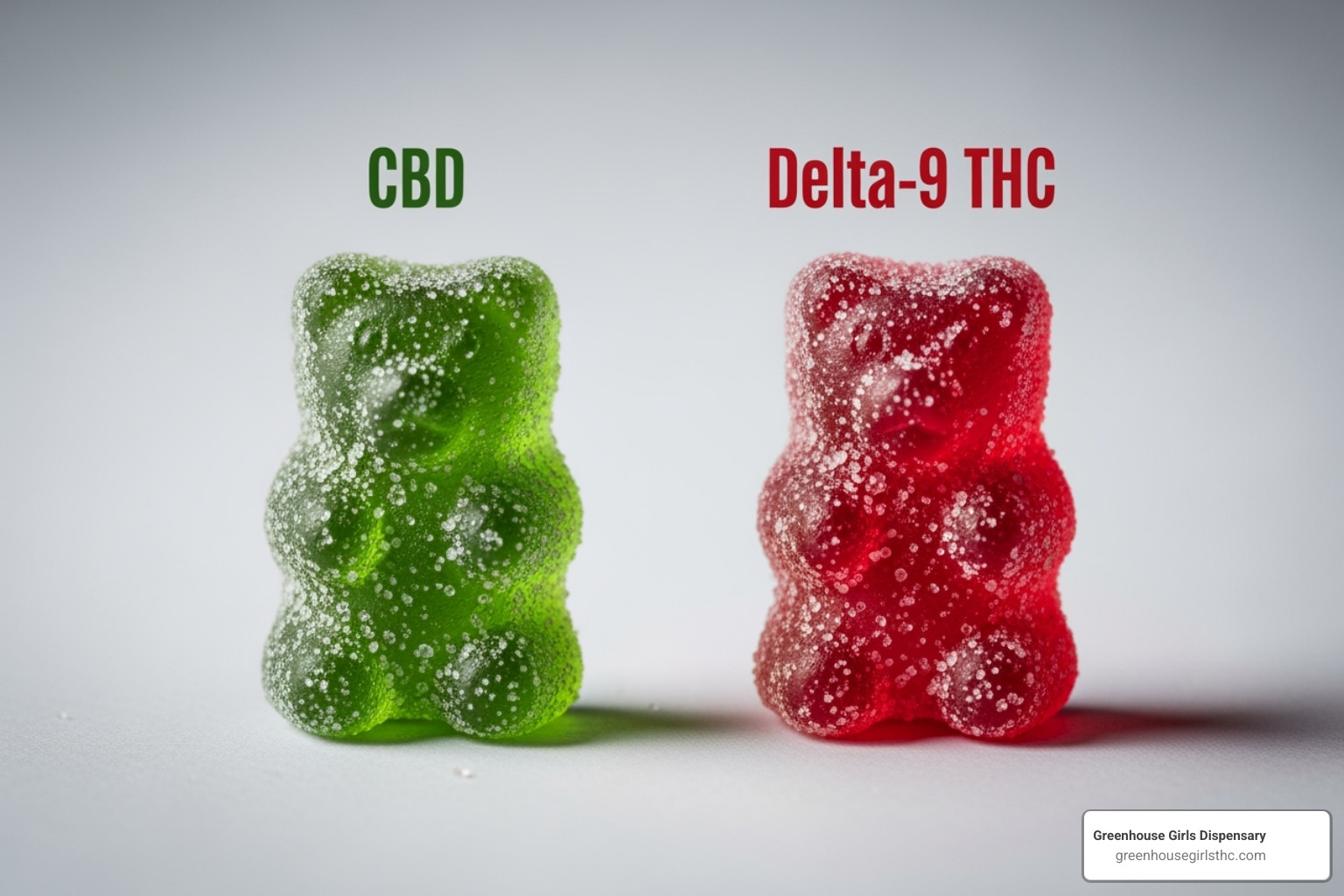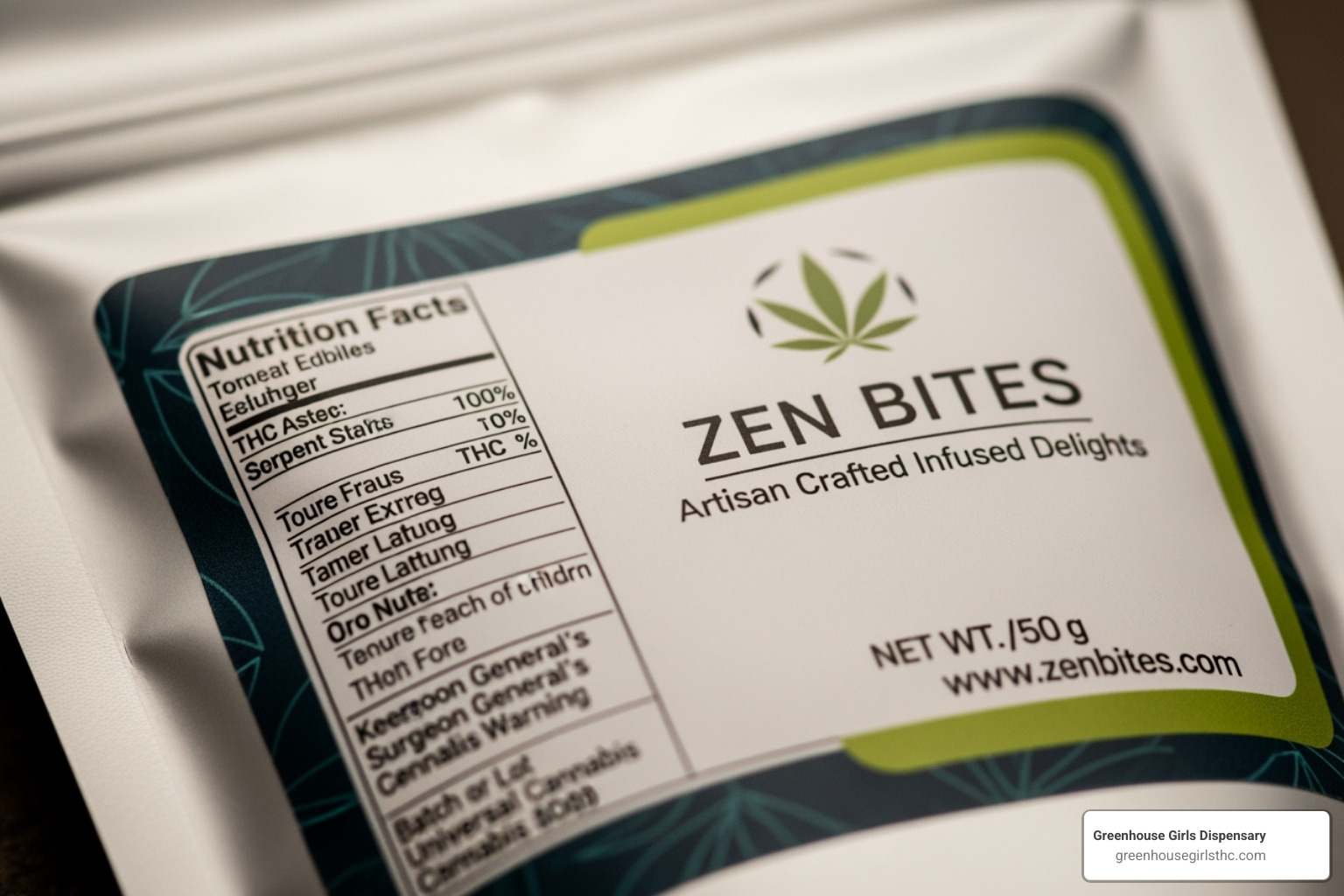
The Edible Truth: Your Guide to Hemp-Derived Delta-9
A New Era of Legal Edibles
Hemp-derived delta 9 edibles are federally legal THC products containing up to 0.3% Delta-9 THC by dry weight, as defined by the 2018 Farm Bill. They can deliver potent psychoactive effects while complying with federal regulations.
Key Facts About Hemp-Derived Delta-9 Edibles:
- Legal Status: Federally legal under the 2018 Farm Bill when containing <=0.3% Delta-9 THC by dry weight
- Effects: Produce euphoria, relaxation, and other psychoactive effects similar to traditional cannabis
- Potency: Can contain 5-15mg of Delta-9 THC per serving while staying legally compliant
- Availability: Sold online and in stores without requiring a medical card in most states
- Duration: Effects typically last 3-6 hours with onset occurring 30-90 minutes after consumption
The 2018 Farm Bill dramatically changed the cannabis landscape by creating a legal pathway for hemp-derived products. This opened the door for a new category of edibles that blurs the line between hemp and marijuana. While many assumed all THC products remained federally illegal, clever manufacturers found they could create potent edibles by focusing on the "dry weight" measurement instead of total THC content.
However, this emerging market has challenges. Recent research reveals 66% of hemp delta-9 products have inaccurate dosages (off by over 10%), and 75.5% aren't proven free from impurities. These findings highlight the importance of choosing reputable sources.
I'm Selena Jochumsen. Through my work with Greenhouse Girls and the National Cannabis Industry Association's Hemp Committee, I've seen how hemp derived delta 9 edibles are reshaping cannabis access. My experience has shown me the critical need for consumer education in this evolving market.

Decoding the Legality: How Are Hemp-Derived Delta-9 Edibles Legal?
How can these psychoactive gummies be legal? The answer is in the 2018 Farm Bill's definition of hemp: cannabis containing no more than 0.3% Delta-9 THC by "dry weight basis." Congress likely intended this for products like CBD oil, not potent edibles.
The 0.3% limit applies to the percentage of THC, not the total amount. A 4-gram gummy, for example, can legally contain about 12mg of Delta-9 THC and still meet the legal threshold.
Think of it this way: a large cookie that is 10% chocolate chips by weight can still have a lot of chocolate chips. The percentage is low, but the total amount can be significant.
The USDA oversees this legal pathway, allowing for products that were impossible just a few years ago. Now, you can buy genuinely potent hemp derived delta 9 edibles in most states without special cards.
However, federal legality isn't universal. States can prohibit these products. The legal landscape changes quickly, so what's legal in our Palm Harbor and Oldsmar locations might not be where you live.
For our Florida customers, we explain the state's specific laws in our guide Are Delta 9 Gummies Legal in Florida? Yes, Here's Why. For those elsewhere, Norml's helpful map is a great resource for checking local laws.
Hemp vs. Marijuana: Understanding the Source
Hemp and marijuana are the same plant, Cannabis sativa L. The only legal distinction is their Delta-9 THC content by dry weight.
Hemp is at or below the 0.3% Delta-9 THC threshold. Marijuana is above it. That is the only distinction that matters legally.
This source plant distinction creates a unique legal classification. The Delta-9 THC molecule in a hemp gummy is identical to the one in a dispensary brownie. But because of its source and concentration in the final product, one is federally legal, and the other is not. For a deeper dive, see our article Hemp-Derived vs. Marijuana-Derived Cannabis: What's Really the Difference?.
The Difference Between Hemp-Derived Delta-9 and CBD

CBD and Delta-9 THC are cannabinoids from the same hemp family, but they work very differently with your body's endocannabinoid system.
CBD is non-psychoactive, offering wellness benefits like managing discomfort and promoting relaxation without any intoxicating effects. You might feel more balanced, but your head stays clear.
Delta-9 THC is psychoactive. When you consume hemp derived delta 9 edibles, the THC binds to CB1 receptors in your brain, creating euphoria and an altered state of consciousness. It will change how you feel.
Both offer benefits, but they take different approaches. CBD works behind the scenes to support your body's balance, while Delta-9 THC steps into the spotlight to change the experience. You can choose your adventure: wellness without the buzz (CBD) or a legal high (hemp derived delta 9 edibles).
Understanding Hemp Derived Delta 9 Edibles: Potency, Effects, and Benefits
Hemp derived delta 9 edibles deliver the full, traditional cannabis experience within legal hemp boundaries. Their effects can be surprisingly intense for newcomers.
When you eat a Delta-9 gummy, your liver converts the THC into 11-hydroxy-THC, a more potent compound. This is why edibles often feel stronger and last longer than inhaled cannabis.
Patience is key with edibles. Unlike smoking, effects take 30 to 90 minutes to begin. Onset time is influenced by your metabolism, body weight, and recent food intake. Once they kick in, the effects typically last 3 to 6 hours.
Our golden rule is to start low and go slow. A typical serving is 5mg to 10mg of Delta-9 THC. If you're new, start with 1-5mg (a quarter or half a gummy) and wait at least 90 minutes before taking more. Many have learned this lesson the hard way.
The effects are what make these products so appealing. Users report euphoria, a sense of well-being, relaxation that melts away stress, and mood elevation. Many also find sleep support from Delta-9 THC's relaxing properties.
2021 research indicates THC may help with anxiety, glaucoma, insomnia, low appetite, muscle spasticity, nausea, and pain. If you're wondering how these treats can be so effective while staying legal, we explain it in Why Hemp Gummies Get You High and Why That's Legal.
Potential Therapeutic Uses
Beyond recreation, Delta-9 THC shows significant therapeutic potential.
Appetite stimulation (the "munchies") is a well-known effect with medical value. The FDA has approved dronabinol, a synthetic Delta-9 THC, to help HIV, chemotherapy, and anorexia patients regain their appetite.
Many users find pain relief and nausea reduction from hemp derived delta 9 edibles. For anxiety management, the right dose can create a calming effect, though too much can have the opposite result.
While these benefits are promising, these products are not approved medical treatments. Always consult your healthcare provider about medical concerns.
Comparing Hemp Derived Delta 9 Edibles to Other Hemp Products
The main difference between Delta-9 and CBD edibles is intoxication. Hemp-derived Delta-9 edibles are intoxicating and federally legal under the 0.3% rule, though state laws vary. They are sold online and in specialty stores.
CBD edibles are non-intoxicating and more widely available. They offer wellness benefits without psychoactive effects. Choose Delta-9 for a legal high and CBD for wellness without the buzz.
The Wild West: Safety Concerns and Regulatory Gaps
Despite being federally legal, the hemp derived delta 9 edibles market lacks federal oversight, creating significant quality control issues. This "Wild West" environment is why we at Greenhouse Girls prioritize transparency and rigorous lab testing.
Recent research is shocking: a Potency and safety analysis of hemp delta-9 products found 66% of products had dosages that were off by more than 10%. This inaccuracy can lead to unpredictable or disappointing experiences.
The study also found that the average advertised dosage (12.98 mg) often exceeds the 10 mg limit found in many regulated states, suggesting hemp products can be more potent than their regulated counterparts.
Even more concerning, while most products provided lab reports, 75.5% were not proven free from harmful contaminants. This is because 71.1% of the reports omitted tests for impurities like pesticides, heavy metals, or residual solvents.

Packaging and accessibility are also troubling. 81.1% of products lacked child-resistant containers, a terrifying oversight for intoxicating products. Only 15.1% of companies used age verification at checkout, and 98.1% didn't require an adult signature on delivery.
Half of the products lacked batch IDs for traceability, and nearly three-quarters omitted the universal cannabis symbol. These are not minor oversights; they are failures in basic consumer safety.
Naturally Occurring vs. Converted THC
Many people don't realize that much of the Delta-9 THC in these edibles isn't extracted directly from hemp. Because hemp contains little Delta-9 THC, manufacturers often convert it from CBD. Research found that 49% of products used Delta-9 THC converted from CBD.
This chemical synthesis can leave behind residual solvents or other impurities if not performed and purified correctly. The process can also create unwanted byproducts. Researchers can often detect converted THC by examining the trans:cis ratio; 77.6% of products had ratios suggesting conversion or non-hemp sourcing.
This distinction is important because chemically converted cannabinoids may not have undergone the same safety testing as naturally extracted compounds.
Risks and Side Effects
It's important to understand the potential downsides. Common, temporary side effects include dry mouth, red eyes, increased heart rate, impaired coordination, and drowsiness. More concerning side effects can include anxiety, paranoia, and nausea, especially with high doses.
There are also long-term considerations. Research from 2014 suggests adolescent cannabis use might affect brain development. This highlights the importance of age restrictions.
Like any substance affecting the brain's reward system, there is a risk of developing cannabis use disorder. Studies show that between 9% and 30% of users may develop this condition. Responsible consumption and knowing your limits are essential.
How to Choose High-Quality Products and Consume Safely
The unregulated nature of the hemp derived delta 9 edibles market requires you to be your own safety advocate. At Greenhouse Girls, we address this by sourcing from small family farms and lab-testing every product.
Third-party lab testing is essential. Reputable companies use independent, accredited labs to verify both potency (THC content) and safety (freedom from contaminants). This ensures the product is what the label claims.
A quality product must have a Certificate of Analysis (COA), which should be easily accessible on the product page or via a QR code on the packaging. If a company hides its COA or doesn't provide one, that's a major red flag.
When reviewing a COA, you want to see tests for cannabinoid potency, heavy metals, pesticides, residual solvents, and mycotoxins. Missing tests mean you're taking unnecessary health risks.
Beyond lab results, choose reputable vendors with positive reviews and transparent practices. We are proud to offer federally legal, lab-tested products that meet these high standards.
Reading product labels carefully is also important. Look for clear Delta-9 THC content, a full ingredients list, batch IDs, manufacturing/expiration dates, and warning labels. For our Florida customers, our guide on How to Tell if a THC Gummy is Legal in Florida explains what to look for.
Will Hemp-Derived Delta-9 Show Up on a Drug Test?
Yes, hemp derived delta 9 edibles can cause you to fail a drug test. This is a critical point to understand.
Drug tests don't differentiate between legal hemp-derived THC and marijuana-derived THC. They detect THC metabolites, which your body produces after consuming any form of Delta-9 THC.
The detection window varies. For regular users, THC can be detectable in urine for up to 30 days and in hair for up to 90 days. For occasional users, the window may be a few days to a week, but there's no guarantee.
Your metabolism, body composition, and frequency of use all influence how long THC remains in your system.
If you are subject to drug testing for any reason, it is best to avoid all THC-containing products, including hemp derived delta 9 edibles. The legal status of the product will not affect the test result.
Frequently Asked Questions about Hemp-Derived Delta-9 Edibles
The world of hemp derived delta 9 edibles can be confusing. Here are answers to the most common questions we receive.
How long do hemp-derived Delta-9 edibles take to kick in and how long do the effects last?
Edibles typically take 30 to 90 minutes to kick in. The delay occurs because the THC is processed by your digestive system and liver, where it's converted into the more potent 11-hydroxy-THC before entering your bloodstream. Onset time depends on your metabolism and whether you've eaten on an empty stomach or a full stomach. Once active, effects usually last 3 to 6 hours.
What is a typical dose for a beginner?
For beginners, the rule is simple: start low and go slow. We recommend a starting dose of 1 to 5mg of Delta-9 THC, which may mean cutting a 10mg gummy into quarters or half. You can always take more, but you can't take less. Wait at least 90 minutes to assess the effects before considering another dose. Everyone's individual tolerance is different, and edible potency variation can occur, so find what works for you.
What's the difference between Delta-8 and hemp-derived Delta-9?
Delta-8 and Delta-9 THC are often confused. Both are psychoactive cannabinoids, but they have key differences.
A minor change in their chemical structure makes Delta-9 significantly more potent, producing the classic cannabis high. Delta-8 is generally milder and less likely to cause anxiety. A 2022 study confirmed that Delta-8 seems less potent than Delta-9.
From a natural vs. synthetic standpoint, Delta-9 THC is abundant in cannabis. Most Delta-8, however, is chemically converted from CBD, which can introduce safety concerns about impurities, similar to some converted Delta-9 products.
Their legal status is similar under the 2018 Farm Bill, but some states have specifically banned Delta-8 while allowing hemp-derived Delta-9 products.
If you want the classic THC experience, hemp derived delta 9 edibles are your best choice. If you prefer something milder, Delta-8 might be an alternative.
The Takeaway: Navigating the World of Legal THC
Hemp derived delta 9 edibles represent a major shift in cannabis access. The 2018 Farm Bill's "dry weight" rule allows millions of Americans to legally experience Delta-9 THC's effects without a medical card or living in a recreational state.
This new frontier brings both opportunity and responsibility. The market's minimal federal oversight makes choosing reputable sources absolutely critical for your safety.
Remember the statistics: many products have inaccurate dosages (66%) or lack proof of purity (75.5%). This information should empower you as an informed consumer. By demanding comprehensive COAs and third-party lab testing, you can enjoy these products confidently.
At Greenhouse Girls, we solve these quality concerns. Every product we carry is lab-tested and sourced from small family farms committed to excellence. Whether you visit us in our Palm Harbor or Oldsmar locations or order for nationwide shipping, you can trust our labels.
Consumer responsibility is key. Starting with low doses, waiting for effects, and storing products safely are essential practices for exploring legal THC.
For many, hemp derived delta 9 edibles offer their first legal opportunity to experience the benefits of Delta-9 THC. Access no longer depends on your zip code or medical status, which is a remarkable development.
If you're ready to explore this world safely, our guide on Where to Buy Delta 9 Edibles Legally Without a Medical Card can help. We're here to support your journey with high-quality products and the information you need.
The future of legal cannabis is evolving, and hemp derived delta 9 edibles are just the beginning. By staying informed and consuming responsibly, you help shape a safer, more accessible cannabis market for everyone.







